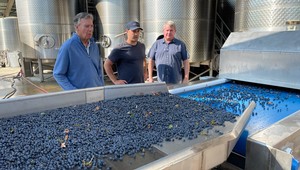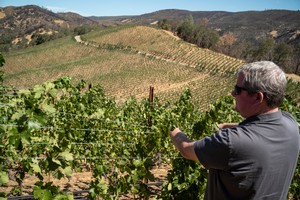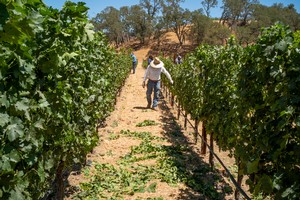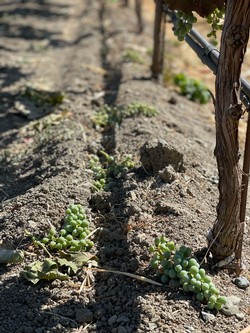The Nature of Our Harvest
As October comes to a close, we’re reflecting on another successful harvest season. We’re overwhelmed with gratitude for our hard-working team, a season without any significant fire events near our vineyards, and a crop of grapes on their way to make a delicious vintage. With the implementation of sustainable farming practices, new technologies for efficient processes, and the uniquely diverse nature of our estate that lends itself to our distinctive winemaking style, our harvest is the ultimate uncommon adventure.
Sustainability Efforts
At Priest Ranch, we live and breathe a philosophy of stewardship through sustainability. Every decision made in the vineyard is impacted by our dedication to sustainable farming, environmental conservation, purposeful irrigation techniques, drought mitigation, fire control, and reducing our winery’s carbon footprint. Through resilience and a continual commitment to shepherding the estate to its fullest potential, Winemaker Craig Becker humbly understands that we must “dance with Mother Nature” rather than try to fight her, even when the dance isn’t always beautiful. Faced with the effects of another dry year in the Napa Valley and the state of California, we chose to reduce our harvest to only the highest quality grapes from hand-selected vine stocks. While this may mean we will have a lighter 2021 vintage, the excellence we strive for in our wines will remain.
Efficient Technology

Harvest is always exciting, not just for our vineyard and cellar crews but for everyone on the Priest Ranch team. We continue to make it extra exciting with the use of cutting-edge technology. In the vineyard, we use neutron probes and aerial mapping technology to reduce water usage significantly. “We started with a few neutron probes, but now we have 14 different ones to match soil profiles across the vineyards,” Craig explained. “They measure water availability in the soil and allow us to track the history of each vintage year over year, minimizing water use based on current and historical needs.” In our second year of working with the mapping system, Craig is provided with insight on irrigation, variability in soil moisture and vine growth across parcels, and precise grape-ripeness measurements, so the team knows when the fruit needs more time or water to improve its quality. Then, once the grapes are picked and destemmed, we use an optical sorter that employs high-speed cameras and image-processing software to quickly and accurately scan and sort the grapes. Through all of these highly efficient tools, we can streamline our processes while saving the energy of our harvest crew and reducing our carbon footprint.
The Nature Behind the Wines

From Grenache Blanc to Malbec, our Somerston Estate provides estate-farmed fruit that produces uncommon quality and character wines. With 1,682 acres embracing two valleys (Soda Valley and Elder Valley) and three ridges hidden deep in Napa’s Vaca Mountain range, our naturally beautiful and pristine yet rugged and raw estate is the source of our critically acclaimed wines. Nearby soda springs, beautiful Lake Hennessey, and creek beds lend to our diverse topography, soils, and microclimates. It’s a bucolic, agricultural nirvana, and winegrowers’ playground with 244 planted acres and 180 unique vineyard blocks across 15 distinct sites. Our unique property and custom vineyard design allow us to create wines that showcase particular expressions of the diverse terroir. Craig and his team use a traditional, hands-off approach incorporating gentle, methodical practices and pump-overs to produce balanced, accessible, and age-worthy wines in the winery. Fermentations are via natural yeasts, and all wines are unfined and unfiltered. With respect for the nature of our estate, the art of wine-growing, and the science of winemaking, Craig’s passion is reflected in every bottle.

Uncommon Adventure
As farmers and scientists, we’re faced with new challenges year after year, but how we adapt to those challenges is what makes each harvest an adventure. Just like the vines, we need to struggle a bit to produce our highest quality work. But at the end of the day, we’re proud stewards of the land that strive to do things the right way… even if it is a bit uncommon.



